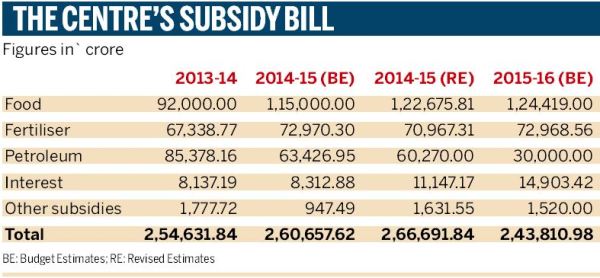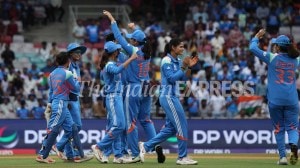 The Budget has kept the fertiliser subsidy for 2015-16 virtually unchanged from the current fiscal’s levels.
The Budget has kept the fertiliser subsidy for 2015-16 virtually unchanged from the current fiscal’s levels.
For all the talk of the JAM Trinity — Jan Dhan, Aadhaar and Mobile — in the latest Economic Survey, there is little in the Union Budget to show any major move to rationalise subsidies or replace these with targeted direct benefit transfers (DBT).
The Budget has made a provision of Rs 2,43,810.98 crore for 2015-16, which is below the revised estimates of Rs 2,66,691.84 crore for the current fiscal. But this reduction is entirely on account of petroleum subsidy, which is projected to fall by over Rs 30,000 crore mainly courtesy lower global oil prices.

On the other hand, subsidies on food and fertilisers are set to go up. “This reflects over-caution when it comes to big-ticket subsidies. It appears the government does not want to extend DBT beyond LPG cylinders or scholarship schemes,” said Ashok Gulati, former chairman of the Commission for Agricultural Costs and Prices.
[related-post]
Story continues below this ad
According to him, the over-caution with regard to food and fertiliser subsidy wasn’t good for Indian agriculture. The farm sector grew by 4.1 per cent during the 11th Five-Year Plan period (2007-08 to 2011-12).
“The last three years have seen average growth of 2 per cent. At a time when crop prices are falling, the focus should have been on reducing cultivation costs, requiring a redirection of spending from subsidies to public investment in farm R&D, rural roads and other infrastructure,” Gulati said.
The Budget has kept the fertiliser subsidy for 2015-16 virtually unchanged from the current fiscal’s levels. “That by itself indicates no plans as of now to increase maximum retail prices. This is more so in the case of urea, where there were expectations of a phased programme of decontrol with a fixed per-tonne subsidy as in other fertilisers,” an industry analyst said.
 But the fertiliser industry is not happy. “We will be ending this fiscal with outstanding subsidy dues of Rs 40,000 crore. The budgetary provision of under Rs 73,000 crore does not take care of this. Overall, it is a disappointing budget,” Satish Chander, Director General, Fertiliser Association of India, told The Indian Express.
But the fertiliser industry is not happy. “We will be ending this fiscal with outstanding subsidy dues of Rs 40,000 crore. The budgetary provision of under Rs 73,000 crore does not take care of this. Overall, it is a disappointing budget,” Satish Chander, Director General, Fertiliser Association of India, told The Indian Express.
Story continues below this ad
Similarly on food, there has been no attempt to implement any of the recommendations of the Shanta Kumar high-level committee for restructuring of the Food Corporation of India.
The panel had suggested instituting a system of cash transfers in place of physical grain delivery through ration shops over a 2-3 year period. This transition was to be first attempted in cities with population above one million. The committee had also sought to reduce the coverage of the National Food Security Act (NFSA) from 67 per cent of the population to around 40 per cent.
But going by the provisions in the Budget — Rs 1,24,419 crore, of which Rs 64,919 crore is towards the implementation of NFSA — there is no move to implement either the Shanta Kumar panel’s report or DBT. In this case, too, the subsidy provided will not be enough to cover the estimated outstanding dues of around Rs 50,000 crore owed to the FCI as on March 31, 2015.

 The Budget has kept the fertiliser subsidy for 2015-16 virtually unchanged from the current fiscal’s levels.
The Budget has kept the fertiliser subsidy for 2015-16 virtually unchanged from the current fiscal’s levels.































